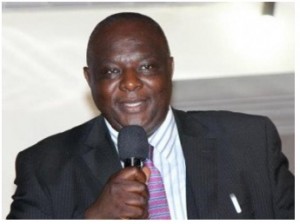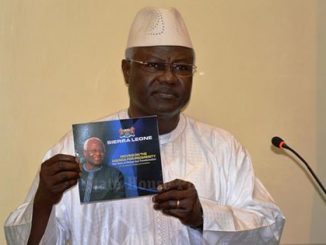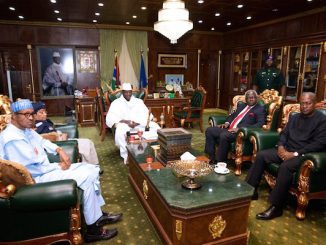
Titus Boye-Thompson, Stratregic Media & Development Communications Unit :
Professor Jimmy Kandeh puts it succinctly when he posted on his facebook page that “Parallels between the war in Sierra Leone and the current Ebola outbreak are unmistakable and instructive: both threatened national security and the very survival of our people; both emanated from across the border but found fertile ground in our country; the government was caught off guard and unprepared in each case, with some even denying the gravity of the threats posed.”
The creeping realization is now how poignant such an observation is and the crescendo that it bodes if its final theatre has to be Freetown, the metropolis and center of activity in the country. Would its impact be more somber as did the war or what would it take to quell the scourge in this theatre without carrying over the residual perplexities of such a showdown in a such a complex community of disparate values, status and lifestyles. How does the inter-relationships play out given that the haves and have not’s do not necessarily have a separating barrier in this place when issues like weddings and funerals come to be expatiated.
In another take, Sewa News Reporter, Lango Deen Sankoh explored the myths and misconceptions on Ebola, citing some of the belief structures that conspired to wedge our communities in a false hope. Some think “if I wash myself with hot water and salt as the Pastor ordered, I would be free from Ebola.” Whilst other simply infer that “People don’t realize it, but Ebola is just cholera in disguise.” In furthering her arguments, she explained that “fighting these misconceptions and allowing an informed discussion is vital in controlling Ebola,” whilst “Providing correct information and convincing the community of the facts on Ebola is vital.”
Accepting Mrs Dean Sankoh’s comments, Sheikh Umarr Kamara, another online publisher, confirmed that “ Indeed, “myths” and “perspectives” about/on Ebola are very much alive. Speaking to family members and friends on a daily basis clearly tells me that knowing about the different “myths” or “perspectives” people hold about Ebola is very important. If the people should practice habits of safety, they must be “moved” from where they stand to a position where they see the safe habits as meaningful. For example, someone in Lunsar argued with me yesterday about the reality of the Ebola virus. For him, because only the Nurses at Mabesseneh hospital have so far died while no nurse in the other centers has died, their deaths were as a result of a “curse” brought upon them for duping a Fula. That the hospital personnel in Mabesseneh had stolen a huge sum of money from a Fula patient some months ago and were “cursed;” that is why only those
nurses are dying. Their deaths, according to this individual, was not caused by Ebola…….The implications for such a perspective are enormous.”
Mohammed Gibril Sesay, Presidential Aide and an accomplished academician, former Lecturer of Sociology at Fourah Bay College contributed that there are “Lots of narratives about Ebola, and very challenging because Ebola hits at the tactile grounding of our notions and cultural practices of intimacy, caring, greeting. Denial is a response to this radical doing away of so many facets of our everyday life. A cultural revolution is taking place right before our eyes, questioning visitations, funeral attendances, greetings, togetherness, kindness to strangers, pity for diseased and deceased relatives and more and more and more.”
In all of these reactions are the reflections of how Ebola and its rampaging message of death, crudity and disregard for human dignity and an energetic virulence has invaded and rampaged the social fabric of our society. As a country, Sierra Leone in its own cultural disposition has been forced to dispense with traditions and the cultural attachment to its dead. Guinea and Liberia are managing the disease in much the same way because of the practicality of distancing to contain the virus and reduce its spread and cross contamination.
The key to an effective mechanism of control that has worked rather speedily across the region has been the veracity and rapidity of information dissemination. Where information is of such primordial importance, the rise in myths is to be accepted as a byproduct. Any news is good news as long as it is news about defeating the scourge.
UNICEF is leading social mobilization activities in Sierra Leone, these include training door-to-door volunteers who go into the communities to spread the word about Ebola and providing them with motorbikes to reach remote areas. UNICEF has also produced posters and pamphlets, radio shows and drama series that all serve to engage the community on Ebola messages that will help to dispel myths like the ones above.
Nonetheles, myths do abound and tacit misconceptions permeate all sections of society. Given the role of communications in containing the spread of Ebola in Sierra Leone, it would be foolhardy for one entity to attempt to corner the market as UNICEF has done. Their mass reach is undeniable but the issue is at the grassroots level where the information is much needed. Some groups and communities have their own trusted advocates. They recognize communications better when put in their respective context. There is increasing fear that trusted community
The key to an effective mechanism of control that has worked rather speedily across the region has been the veracity and rapidity of information dissemination. Where information is of such primordial importance, the rise in myths is to be accepted as a byproduct. Any news is good news as long as it is news about defeating the scourge.
UNICEF is leading social mobilization activities in Sierra Leone, these include training door-to-door volunteers who go into the communities to spread the word about Ebola and providing them with motorbikes to reach remote areas. UNICEF has also produced posters and pamphlets, radio shows and drama series that all serve to engage the community on Ebola messages that will help to dispel myths like the ones above.
Nonetheles, myths do abound and tacit misconceptions permeate all sections of society. Given the role of communications in containing the spread of Ebola in Sierra Leone, it would be foolhardy for one entity to attempt to corner the market as UNICEF has done. Their mass reach is undeniable but the issue is at the grassroots level where the information is much needed. Some groups and communities have their own trusted advocates. They recognize communications better when put in their respective context. There is increasing fear that trusted community interlocutors are being sacrificed for door to door trainees or radio broadcasts, which in the main do not resonate to certain communities. It is crucial that communication dynamic are structured to meet communities at their level of engagement. There must be a flexible approach to conducting outreach and the broader remit to communicate with our diverse communities, otherwise the message will be lost.




Leave a Reply